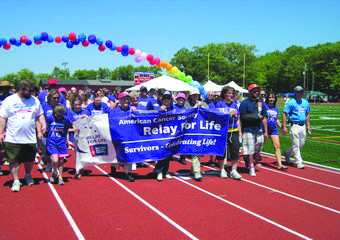Cancer never sleeps, nor will the participants in Relay For Life, which will take place May 21 to 22 at the Natick High School.
The Relay For Life of Natick, Framingham and Sherborn is a 24-hour event during which time teams will undertake a fundraising walk to raise money in the fight against cancer.
“It started in 1985 with an oncology doctor [Gordy Klatt], who gave to the American Cancer Society for years,” Renee Hanscom, community manager at Relay For Life, said. “He ran marathons, and came up with the idea of a 24-hour walk as his marathon. He recruited some friends, and it led to what we have now.”
Relay For Life events take place across the country, with people coming together to form teams to work together. Throughout the duration of the event, there will always be a member from each team walking the track.
“The idea is, cancer never sleeps, and cancer never stops,” Hanscom said.
The continued success of Relay For Life events, Hanscom said, is that cancer is a disease that affects many people and families, making people more inclined to become involved.
“A lot of people have a personal connection to cancer, so they want to form a team,” she explained. “Or, people may have participated in other Relay For Life events in the past, then want to do so again when there is an event in their area.”
Anyone can form a team and there is no minimum amount teams must raise to participate. However, the American Cancer Society does ask that teams raise at least $100, as that amount can go a long way in helping those who are battling cancer.
“When you combine that amount with the programs we offer, it ends up being a huge amount,” Hanscom said.
Funds raised during Relay For Life events benefit a variety of programs, according to the American Cancer Society’s website. The money is allocated between cancer research, lodging and transportation for patients receiving cancer treatment, as well as services to help those affected by cancer to work toward bettering their physical and mental states.
According to Hanscom, the Hope Lodge program is a highly used service that is vital for those undergoing cancer treatment far from their home.
“The average treatment period is eight weeks,” Hanscom said. “The Hope Lodge facilities allow people who live more than 40 miles from their treatment center to stay there with a friend or family member for free throughout the duration of their treatment. [The American Cancer Society] also partners with hotels across the country that enable patients to stay at a minimal cost.”
Funds for the events are raised in various ways, from word of mouth to typical fundraisers, like bake sales and car washes. Some of the bigger teams host events, such as dances and comedy shows. Funds can also be raised during the event itself.
“Teams set up tents, and it’s common for people to sell items out of their tents, like cake pops and things like that,” she said. “That is where the social component of Relay [For Life] comes into play. You don’t just stay with your team; you talk to and interact with everyone.”
The structure of the Relay For Life event includes an opening ceremony, a survivor lap and a luminaria ceremony, where candles are lit in memory of those lost to cancer. While Hanscom says the luminaria ceremony is the most solemn portion of the evening, she also emphasizes that it is meant to be an uplifting event, joining together those who are affected by cancer and enabling them to provide support to one another.
“We want people to have fun,” Hanscom said. “It’s a family event and a great opportunity to get involved and show people that cancer doesn’t have to be a scary word. It’s just an amazing place where people can be supportive of one another and form amazing bonds.”
For more information, visit the American Cancer Society Relay for Life website, http://bit.ly/1Vg2s2K.

Issue Date:
April, 2016
Article Body:
